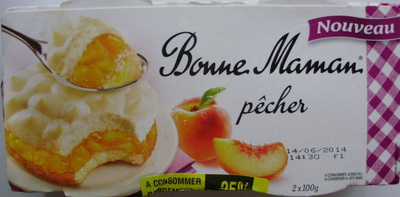Pêcher - Bonne Maman - 200 g (2 x 100 g)
This product page is not complete. You can help to complete it by editing it and adding more data from the photos we have, or by taking more photos using the app for Android or iPhone/iPad. Thank you!
×
Barcode: 3608580723189 (EAN / EAN-13)
Common name: Dessert pâtissier
Quantity: 200 g (2 x 100 g)
Packaging: Plastic, Pot, Cardboard, Sleeve
Brands: Bonne Maman
Categories: Snacks, Desserts, Sweet snacks, Biscuits and cakes, Cakes, fr:Gâteaux aux pêches
Labels, certifications, awards: New
Manufacturing or processing places: Novandie (Filiale Groupe Andros) - Route de Roinville - 28700 Auneau, Eure-et-Loir, Centre-Val de Loire, Tradifrais (Filiale Groupe Andros) - 6 Rue du 19 Mars 1962 - Zone Industrielle - 46130 Biars-sur-Cère, Lot, Midi-Pyrénées, France
Traceability code: FR 28.015.011 CE - Auneau (Eure-et-Loir, France), FR 46.029.001 CE - Biars-sur-Cère (Lot, France)
Link to the product page on the official site of the producer: http://www.bonne-maman.com/desserts-pati...
Stores: Carrefour market, Banque alimentaire
Countries where sold: France
Matching with your preferences
Environment
Packaging
Transportation
Report a problem
Data sources
Product added on by openfoodfacts-contributors
Last edit of product page on by packbot.
Product page also edited by jacob80, tacite.






